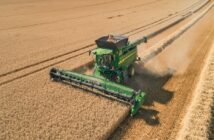UK farmers and growers must have access to a skilled and flexible labour source or there could be a devastating impact across many farming sectors, the NFU has warned today. The call comes as many farmers up and down the country work around the clock to bring in the nation’s harvest.
After the UK’s decision to leave the EU, the NFU said its immediate concerns centred on farming’s ability to access essential markets as well as farmers being able to source essential labour and trade on a level footing with their competitors. With some farming sectors, such as horticulture, relying heavily on non-UK seasonal and year-round workers throughout their grower businesses the NFU has today called for access to labour to be a key consideration in the on-going talks to shape a new domestic agriculture policy.
NFU President Meurig Raymond said: “Horticulture is already experiencing labour shortages and this looks set to get worse. And we know it’s not just horticulture that will be affected. Non-UK workers are often employed in a whole host of roles throughout farming and are crucial in day-to-day tasks as well as at peak times as we are now experiencing with harvest.
“We have already written to the Brexit minister, David Davis, about our concerns, and we continue to meet with Government departments, like the Home Office, to work on behalf of our members to seek assurance that they will be able to have access to the labour they need so they can continue to produce food for the nation.
“There are many ways in which the challenge of accessing labour could be solved and we are consulting with our members over the coming weeks to help find the best solutions. I plan to share their views with the new team at Defra to ensure these grassroots ideas help to shape the new domestic farm policy which is needed – one that puts food and farming at its heart.”
Examples of labour use on-farm include:
Poultry producers are reliant on non-UK staff throughout their businesses, whether it is in the office, to [hands on work], or to helping getting turkeys ready for Christmas. They also say they are concerned of the knock-on effects with processing plants – which also use many non-UK workers.
For crops non-UK workers are crucial especially during the harvest season. And in addition, for tasks that can only be done by hand such as roguing crops1, labour is essential and relied upon by organic farmers. One farmer said he could be forced to end organic production as it would be unsustainable and impossible to meet customer demands.
Dairy and livestock farmers will use non-UK workers in a variety of roles, from herdsmen to tractor drivers, or are reliant on support from non-UK vets, for services such as TB testing. Also non-UK labour is essential for the meat processing industry. Without reliable access to workers processing costs could rise and our ability to compete in world markets could be significantly reduced.



